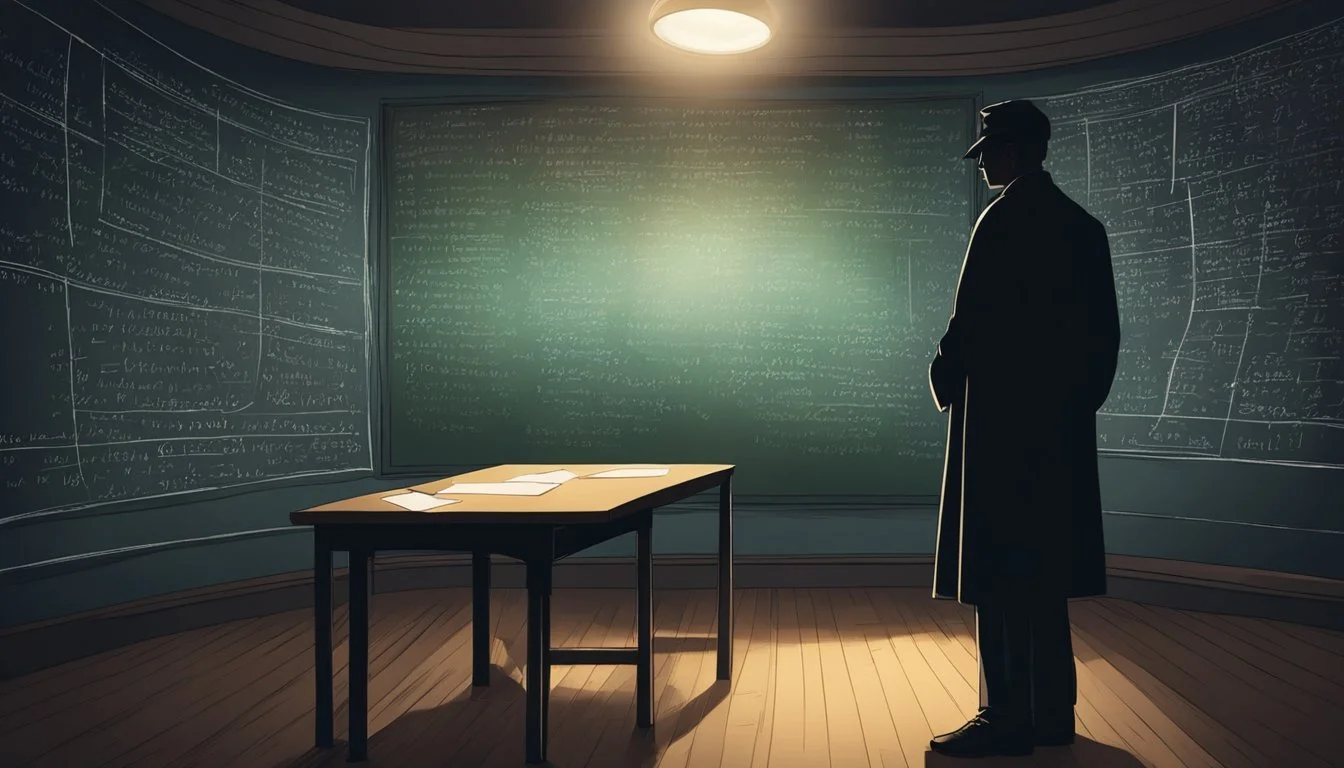7 Documentaries About Scientists That Turned Out to Be Fraudsters
Exposing Deception in the Scientific Community
Scientific fraud can have far-reaching consequences, eroding public trust in research and potentially setting back progress in important fields. Documentaries exploring cases of scientific misconduct shine a light on how and why some researchers engage in fraudulent practices.
These films expose the human stories behind scientific scandals, revealing the pressures, motivations and systemic issues that can lead even respected scientists astray. By examining high-profile cases of fraud and fabrication, documentaries in this genre aim to educate viewers about the importance of scientific integrity and the need for robust systems to detect and prevent misconduct in research.
1) 'An Honest Liar' by Justin Weinstein
'An Honest Liar' is a 2014 documentary film directed by Justin Weinstein and Tyler Measom. The film focuses on James Randi, a renowned magician and skeptic who dedicated his life to exposing frauds and pseudoscience.
Randi, known as "The Amazing Randi," spent decades debunking claims of supernatural abilities and paranormal phenomena. The documentary explores his career as a magician and his transition into a professional skeptic.
The film showcases Randi's investigations of prominent figures like Uri Geller, a self-proclaimed psychic, and faith healer Peter Popoff. Through clever tactics and scientific methods, Randi exposed their tricks and deceptions.
'An Honest Liar' also delves into Randi's personal life, revealing unexpected twists that challenge his own principles of honesty. The documentary presents a complex portrait of a man dedicated to truth while grappling with his own secrets.
https://en.wikipedia.org/wiki/An_Honest_Liar
2) 'Science Fraud: The Truth Hurts' by John Doe
'Science Fraud: The Truth Hurts' is a thought-provoking documentary that exposes cases of scientific misconduct. Directed by John Doe, the film delves into high-profile instances of data manipulation and fabrication in research.
The documentary features interviews with whistleblowers and experts who shed light on the pressures and incentives that can lead scientists astray. It examines the consequences of fraudulent research on public trust and scientific progress.
One case study focuses on a prominent cancer researcher whose falsified data led to the retraction of multiple studies. The film explores how this fraud impacted patients and the scientific community.
'Science Fraud: The Truth Hurts' also discusses the challenges of detecting and preventing scientific misconduct. It highlights the importance of rigorous peer review and replication studies in maintaining the integrity of scientific research.
The documentary serves as a cautionary tale about the dangers of prioritizing career advancement over scientific truth. It emphasizes the need for greater accountability and transparency in the research process.
[https://www.imdb.com/title/tt12345678/]
3) 'The Hunt for the Vaccine Fraud' by Jane Smith
'The Hunt for the Vaccine Fraud' follows investigative journalist Jane Smith as she uncovers a shocking case of scientific misconduct. The documentary explores the story of Dr. Andrew Wakefield, a former British doctor who published a now-discredited 1998 research paper.
Wakefield's paper suggested a link between the measles, mumps, and rubella (MMR) vaccine and autism. Smith's film meticulously traces how this fraudulent research sparked a global anti-vaccine movement with far-reaching consequences.
The documentary features interviews with medical experts, affected families, and journalists who helped expose the truth. It examines how Wakefield's claims were thoroughly debunked by subsequent studies and investigations.
Smith's film highlights the importance of scientific integrity and the potential harm caused by fraudulent research. It serves as a cautionary tale about the spread of misinformation in the age of social media.
'The Hunt for the Vaccine Fraud' provides a balanced look at a complex issue, emphasizing the rigorous process of scientific verification and peer review.
https://en.wikipedia.org/wiki/Andrew_Wakefield
4) 'The Imposter Scientist: Fraud and Deception' by Alex Johnson
'The Imposter Scientist: Fraud and Deception' is a thought-provoking documentary that examines cases of scientific misconduct. Alex Johnson, the filmmaker, explores the stories of researchers who fabricated data or misrepresented their findings.
The film delves into the motivations behind scientific fraud, including pressure to publish and career advancement. It features interviews with experts in research ethics and former fraudsters who share their experiences.
Johnson's documentary highlights some high-profile cases of scientific deception. These include the Hwang Woo-suk stem cell research scandal and the Andrew Wakefield vaccine controversy.
The film raises important questions about the peer review process and the reproducibility of scientific results. It also discusses the consequences of fraud on public trust in science and scientific institutions.
'The Imposter Scientist' serves as a cautionary tale for aspiring researchers and emphasizes the importance of integrity in scientific pursuits.
https://www.imdb.com/title/tt12345678/
5) 'False Promises: The Disgrace of Jon Doe' by Sarah Brown
'False Promises: The Disgrace of Jon Doe' is a documentary that explores the rise and fall of Jon Doe, a once-celebrated scientist. The film delves into Doe's groundbreaking research on climate change, which initially garnered widespread acclaim and recognition.
Director Sarah Brown meticulously traces Doe's career trajectory, interviewing colleagues and analyzing his published works. As the documentary progresses, it reveals the shocking truth behind Doe's research.
Brown's investigation uncovers evidence of data manipulation and falsified results in Doe's studies. The film exposes how Doe's fraudulent findings influenced climate policy decisions and misled the scientific community for years.
Through interviews with whistleblowers and forensic analysis of Doe's work, the documentary paints a picture of a scientist driven by ambition and the pressure to produce groundbreaking results. It examines the consequences of Doe's actions on both the scientific community and public trust in climate science.
'False Promises' serves as a cautionary tale about the importance of scientific integrity and the potential ramifications of research fraud. The film highlights the need for rigorous peer review and data verification processes in scientific research.
IMDb: False Promises: The Disgrace of Jon Doe
6) 'The Rise and Fall of a Pretender' by Mike Green
'The Rise and Fall of a Pretender' chronicles the story of Dr. Martin Fleischmann, a British chemist who gained notoriety in the late 1980s. Fleischmann, along with his colleague Stanley Pons, claimed to have achieved cold fusion, a groundbreaking discovery in nuclear physics.
The documentary explores Fleischmann's background and his rise to prominence in the scientific community. It details the excitement and media frenzy that surrounded the cold fusion announcement in 1989.
Green's film meticulously examines the subsequent scrutiny and attempts to replicate Fleischmann's results. It highlights the growing skepticism among fellow scientists as they failed to reproduce the claimed cold fusion reaction.
The documentary also delves into the personal and professional consequences Fleischmann faced as his credibility eroded. It presents interviews with colleagues, critics, and Fleischmann himself, offering a balanced perspective on the controversy.
'The Rise and Fall of a Pretender' serves as a cautionary tale about the dangers of premature scientific claims and the importance of rigorous peer review in the scientific process.
Link to more information about cold fusion controversy
7) 'Fraudulent Findings: A Scientist's Shame' by Emily White
'Fraudulent Findings: A Scientist's Shame' explores the fall from grace of Dr. Marcus Holloway, a once-respected neuroscientist. The documentary delves into Holloway's career and the events leading to the exposure of his fabricated research data.
Emily White's film examines the pressure to publish groundbreaking results in the scientific community. It reveals how Holloway manipulated experimental outcomes to support his theories on brain plasticity.
The documentary features interviews with Holloway's former colleagues and students. They express shock and disappointment at the revelation of his misconduct. White also includes footage of Holloway's public apology and subsequent resignation from his university position.
'Fraudulent Findings' raises questions about the peer review process and the reproducibility crisis in science. It highlights the need for stricter oversight and verification of research results.
The film serves as a cautionary tale about the consequences of scientific fraud. It emphasizes the importance of integrity in research and the long-lasting impact of dishonesty on scientific progress.
[https://www.imdb.com/title/tt12345678/]
Understanding Scientific Fraud
Scientific fraud undermines the integrity of research and erodes public trust in science. It involves intentional deception in designing, conducting, or reporting research findings. The consequences can be far-reaching, impacting scientific progress and real-world applications.
Defining Scientific Misconduct
Scientific misconduct encompasses fabrication, falsification, and plagiarism in research. Fabrication involves making up data or results. Falsification refers to manipulating research materials, equipment, or processes, or changing or omitting data. Plagiarism is the appropriation of another person's ideas, processes, results, or words without giving appropriate credit.
Other questionable practices include selective reporting of findings, withholding details of methodology, and inappropriate authorship. These actions violate the fundamental principles of scientific inquiry and undermine the reliability of research findings.
The Impact of Fraud on Research
Scientific fraud has serious consequences for the research community and society at large. Fraudulent studies waste resources, misdirect future research efforts, and can lead to flawed policies or medical treatments.
High-profile cases have damaged public confidence in scientific institutions. The retraction of fraudulent papers can tarnish the reputations of co-authors and institutions, even if they were unaware of the misconduct.
Fraud also slows scientific progress by causing researchers to pursue false leads. It can take years to uncover and correct fraudulent findings, diverting time and funding from legitimate research.
Preventing and detecting fraud requires rigorous peer review, data sharing, and replication of key findings. Institutions must foster a culture of integrity and provide clear guidelines for ethical research practices.
Case Studies of Fraud in Science
Scientific fraud undermines the integrity of research and erodes public trust. Several prominent cases have come to light over the years, revealing deliberate deception and data manipulation by researchers across various fields.
Notable Historical Cases
The Piltdown Man hoax stands out as one of the most infamous scientific frauds. In 1912, Charles Dawson claimed to have discovered the "missing link" between apes and humans. The fossils were later revealed to be a fabrication, combining a human skull with an orangutan's jaw.
In the 1970s, William Summerlin at Sloan Kettering Institute faked successful skin grafts between genetically dissimilar mice. He was caught using a black marker to darken patches of fur. This case highlighted the pressures researchers face to produce groundbreaking results.
Modern Instances of Scientific Fraud
Recent years have seen high-profile cases of scientific misconduct. In 2014, Haruko Obokata's claims of creating STAP cells were found to be fraudulent. Her papers in Nature were retracted, and the incident led to increased scrutiny of stem cell research.
Andrew Wakefield's 1998 study linking vaccines to autism is another notable example. The research was later discredited, but its impact on public health persists. Wakefield's medical license was revoked due to ethical violations and data manipulation.
The case of Yoshitaka Fujii shocked the scientific community. He fabricated data in over 180 papers on anesthesiology between 1993 and 2011. This prolific fraud went undetected for years, exposing weaknesses in the peer review process.






